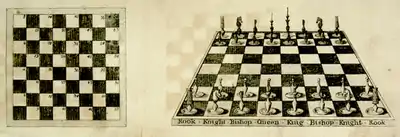William Pelham (1759–1827) was a bookseller and publisher in Boston, Massachusetts, in the late 18th and early 19th centuries. He kept a shop and circulating subscription library at no.59 Cornhill, 1796-1810.[1]
Biography
Pelham was born in Williamsburg, Virginia in 1759, to Peter Pelham, Jr. and Ann Creese. William's grandfather was Peter Pelham, the Boston artist.[2]
William Pelham was working in the book trade in Boston by the 1790s.[3] "In the Independent Chronicle for July 7, 1796, Pelham offered for sale new books and 'an uncommonly fine proof of Mr. Copley's celebrated plate of the Death of Chatham.'"[4][5]
In his bookshop Pelham also operated a circulating library. The 1801 catalog of Pelham's Circulating Library included several hundred titles, including, for example:[6]
- Adela Northington[7]
- Belmont Grove; or the discovery
- Belleville Lodge; a novel
- Female Jockey Club[8]
- Hackney Coach; a sentimental miscellany
- Hive; or repository of sententious essays
- Inside View of the Prisons of Paris[9]
- Hawkins' Letters on the Female Mind
- Looker-On; a periodical work
- Management of the Tongue[10]
- Manual of Liberty
- Mirabeau's Gallery of Portraits
- Mavor's Collection of Voyages and Travels[11]
- Museum of Agreeable Entertainment
- New Foundling Hospital for Wit
- Parker's View of High, and Low Life[12]
- Peruvian Letters
- Reign of George VI Anticipated
- Tooke's Pantheon of the Heathen Deities
- Trimmer's Introduction to the Knowledge of Nature
- Mortimer's Universal Director[13]
- Universal Story-Teller

Pelham's nephew William Blagrove took over the library in 1804, moving it to School Street, and continuing to oversee the enterprise until 1811.[14]
In 1805 Pelham published The Elements of Chess, "one of the earliest works upon chess published in the United States, and the first of its kind printed at Boston. The editor of this volume — (that the book was edited by some chessplayer at the time of its publication is apparent from an exceedingly interesting appendix, containing much new and original matter) — was undoubtedly a nephew of Mr. Pelham's, named William Blagrove, who is known to have been an enthusiast of chess, and a player of merit."[15]
In 1808 he wrote and published A System of Notation, a pronunciation manual for English language. It incorporated "a new edition of a popular English novel, for the purpose of introducing A New System Of Notation; by which the variable sounds of the vowels and consonants in the English alphabet may be accurately distinguished. The irregularity of sound to which many of our alphabetical characters are subject, has been frequently noticed and complained of: more especially by foreigners engaged in learning the language. ... The marks denoting sounds will be on the left hand page; the right hand page will contain the same matter, word for word, the marks of sound being omitted, and the accent distinguished."[16]
From his aunt Sarah Creese, Pelham inherited "the estate, no.59 Cornhill, [in Boston], which her uncle, Rev. Wm. Price had given King's Chapel. ... In 1813 the wardens of King's Chapel sued Pelham and recovered the estate from him."[17][18]
Some time after 1810 he moved to Zanesville, Ohio. He died in New Harmony, Indiana, in 1827.[19][20]
References
- ↑ Boston Directory. 1796, 1807
- ↑ Whitmore. 1872
- ↑ Independent Chronicle, June 20, 1796
- ↑ Bolton. 1907.
- ↑ Copley's painting "Death of the Earl of Chatham" (see Wikimedia Commons image) was engraved by Francesco Bartolozzi in 1791 (see Wikimedia Commons image)
- ↑ Catalogue of Pelham's Circulating Library. Charlestown, Mass.: printed by Samuel Etheridge, 1801
- ↑ WorldCat. Adela Northington, by Mrs. Burke
- ↑ WorldCat. Charles Pigott
- ↑ WorldCat. Honoré Riouffe
- ↑ WorldCat. Laurent Bordelon
- ↑ WorldCat. William Fordyce Mavor
- ↑ WorldCat. George Parker
- ↑ WorldCat. Thomas Mortimer
- ↑ Catalogue of Pelham's Circulating Library, no. 5 School-Street. Removed from no. 59 Cornhill. Boston: Munroe & Francis, printers, November, 1804.
- ↑ Willard Fiske. The book of the first American Chess Congress: containing the proceedings of that celebrated assemblage held in New York in the year 1857 together with sketches of the history of chess in the old and new worlds. NY: Rudd & Carlton, 1859; p.367, 487. Google books.
- ↑ Monthly Anthology, July 1807
- ↑ William H. Whitmore. Who was Thomas Pelham? The New England historical & genealogical register and antiquarian journal. Oct. 1872.
- ↑ Annals of King's Chapel from the Puritan age of New England to the present day, Volume 2. Boston: Little, Brown, 1896
- ↑ Bolton. 1907
- ↑ Shera. Foundations of the public library: the origins of the public library movement in New England, 1629-1855. University of Chicago studies in library science, 1949.
Further reading
Works written/published by Pelham
- The Elements of Chess, a Treatise combining Theory with Practice, and comprising the whole of Philidor's Games and explanatory Notes, new modelled and arranged upon an original Plan. Boston: Wm. Pelham, 1805. Google books.
- An important and luminous communication on the subject of the impressment of American and foreign seamen and other persons. The treaty referred to was negotiated in London during 1806 by Monroe and William Pinkney, and rejected by President Jefferson in 1807. Boston: Published and sold by William Pelham, no. 59, Cornhill. Munroe & Francis, printers, 1808.
- William Pelham. A system of notation : representing the sounds of alphabetical characters by a new application of the accentual marks in present use : with such additions as were necessary to supply deficiencies. Boston: Printed for W. Pelham, 1808.
- Catalogue of juvenile books and literary toys for sale by William Pelham, no. 59, Cornhill, Boston. 1810
Works about Pelham
- Charles K. Bolton. Circulating libraries in Boston, 1765-1865. Publications of the Colonial Society of Massachusetts, Volume 11. Feb. 1907.
External links
- WorldCat. W. Pelham
- Working Men's Institute. Pelham Collection
- http://www.gallantpelham.org/articles/showart.cfm?id_art=74